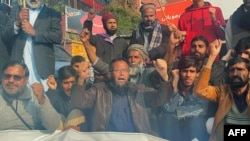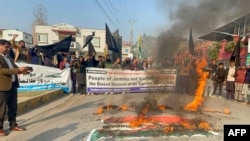Monday’s judgement by India’s Supreme Court upholding Prime Minister Narendra Modi’s government’s move four years ago to scrap the limited autonomy for Jammu and Kashmir state is expected to set back the prospect of any thaw in ties between India and Pakistan.
It will also deepen the alienation in India’s only Muslim-majority region, according to analysts.
In its unanimous verdict, the five-member Supreme Court bench said the special status given to Kashmir was a "temporary provision" and held that its 2019 removal by the Hindu nationalist government was “constitutionally valid.”
The ruling came in response to petitions challenging the revocation of so-called Article 370 that had given the region its own constitution, flag and protections, such as land ownership rights for locals.
Divided between India and Pakistan, the Himalayan territory of Kashmir has for decades been a flashpoint between the two countries, which both claim it in its entirety.
Pakistan’s Foreign Affairs Ministry rejected the ruling by India’s Supreme Court saying it had “no legal value.”
India has “no right to make unilateral decisions on the status of this disputed territory" against the will of the Kashmiri people and Pakistan, Jalil Abbas Jilani, Pakistani caretaker foreign minister said Monday.
After India scrapped Kashmir’s special status in 2019, Pakistan had downgraded diplomatic ties and suspended trade with India.
The deep freeze in relations between the bitter South Asian rivals is expected to continue.
“Essentially India has presented Pakistan a fait accompli in Kashmir. Even if Pakistan rejects it, they cannot change anything,” said Sreeram Chaulia, dean of the Jindal School of International Affairs in Jindal, near Delhi.
“So there is not much in terms of a thaw or reproachment possible,” he said.
He said that with the shifting geopolitics in recent years that have drawn India closer to the United States and the West, and conflicts in Ukraine and between Israel and Hamas, Kashmir has virtually dropped off the international radar.
“India wants its border with Pakistan to be quiet but is not interested in a dialogue process at this point,” Chaulia, said, “Its attention is more focused on the border with China.”
The countries each have elections in coming months. Pakistan will hold elections in February. Dates have not been announced in India, but polls will probably begin in April.
“In South Asian countries, we play to the voting bank. Neither side will talk about peace at this point. Both will only talk about Kashmir in an aggressive manner and ramp up hard lining their stance on Kashmir,” according to Jyoti M. Pathania, a professor of international relations at Jindal School of International Affairs.
After the Supreme Court verdict, Indian Home Minister Amit Shah reiterated India’s claims to Pakistani Kashmir. “PoK [Pakistani-occupied Kashmir] is ours and no one can take it from us," he told Parliament.
Modi’s Hindu nationalist government’s 2019 move in Kashmir had been widely welcomed by most Indians and bolstered his credentials as a strong nationalist leader. The Supreme Court verdict validating the measure will further boost his standing, according to analysts.
Modi called the court verdict "a beacon of hope, a promise of a brighter future" in a post on X, formerly known as Twitter. He said that “the Court in its profound wisdom has fortified the very essence of unity that we, as Indians hold dear and cherish above all else."
A separatist insurgency led by Islamic militant groups that had claimed tens of thousands of lives in Kashmir since it erupted in 1990 has largely waned, though sporadic attacks continue.
In Kashmir, however, the verdict triggered disappointment, according to local observers.
“People are not happy because Kashmiris have historically been very possessive about their identity,” said Noor Mohammad Baba, a political analyst in the Kashmiri capital, Srinagar.
Many Kashmiris saw the 2019 move as a ploy to strip the special identity of India’s only Muslim-majority region by the Hindu nationalist government and take away protections they had over land ownership and local government jobs.
Kashmir, which had been split into two federally administered territories, is now under the direct rule of New Delhi, which has passed new laws that make it possible for Indians from outside Kashmir to become permanent residents of the region.
The government has said that the new measures will integrate Kashmir with the rest of India, create new jobs and help it progress economically.
However, these “have only integrated the land and not the people of Kashmir,” according to Anuradha Bhasin, executive editor of the Kashmir Times. “There is a sense of despair and worry about what lies ahead,” she said. “There are real anxieties on the ground about a demographic change that could take place in the region.”
Local political parties in Kashmir have also expressed disappointment over the ruling.
Former Chief Minister Mehbooba Mufti posted on X that India's verdict is nothing less than a death sentence not only for Jammu and Kashmir but for the idea of India.
The court ruled that Legislative Assembly elections must be held by next September.
“That offers hope that maybe political voices of Kashmiris will get expression,” according to Baba.






